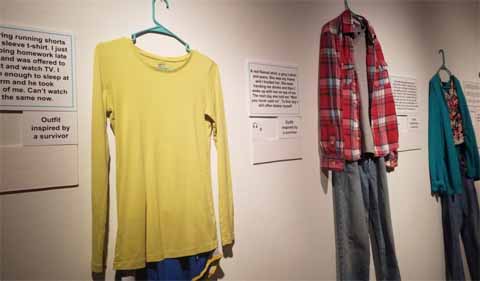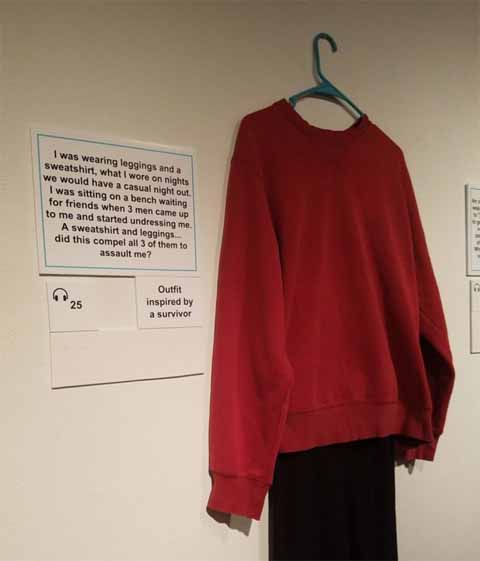There’s an exhibit that challenges the notion of victim blaming in a powerful way, by displaying the stories of survivors on Ohio University’s campus.
The exhibit in Trisolini Gallery called “What Were You Wearing?” runs through Sept. 13 on the fourth floor of Baker Center. The entire exhibit features articles of clothing that people were wearing when they were assaulted, along with their stories hung up next to the clothing displays. The clothing ensembles are inspired or donated by the stories of real survivors.
The exhibit also is accessible to people with visual and hearing disabilities, as the descriptions are available in Braille and there is an iPad with the recorded stories.
This exhibits bites at the common question asked when someone reports sexual assault, “Well, what were you wearing?” This phrase is used as a way to silence victims and insinuate that what happened to them was their fault. In our culture, it’s commonplace for survivors to be asked what they didn’t do to prevent the assault.
Some people wore leggings and a sweater, one wore a yellow tank top. Some assaults happened as early as 8 years old, and others were committed when the person was older, or even married. One person was wearing a flannel pajama set. Many of them talk about how they trusted the person they were with, breaking the misconception that the most frequent assaults are by strangers.
This exhibit focuses the idea that sexual assault is an epidemic, that it happens to anyone wearing anything, and it is not something that victims could ever prevent. This is especially relevant to college culture, where women are more likely to be assaulted.
Sexual assault on campus is a serious issue, and the prevention tactics were often aimed at preventing women from getting raped, but they are now focusing on teaching aggressors not to rape. This exhibit demonstrates survivors’ stories as their own truths and gives them a platform to dispel the myths of sexual assault. It can happen to anyone, and clothing is never a part of the equation.
- For more information on what OHIO is doing to educate and support students, see “Join our community in ending sexual violence.”
How to Get Help
If you are seeking help for sexual assault: It wasn’t your fault. Anyone of any gender can get assaulted. It wasn’t your fault, even if you were drinking, and there are people out there who will believe you.
There are three confidential resources on campus.
There’s a confidential resource on OHIO’s campus called Survivor Advocacy Program located in the first floor of Lindley Hall. The people there can help you report (if wanted) or just to talk. They believe all survivors. They have a 24-hour hotline at 740-597-7233. According to the program’s website:
- If you wish to seek medical attention, the advocate can assist you in locating transportation to the hospital, and personal support during the hospital exam.
- If you wish to report to the police, the advocate will provide support during the reporting and interview process.
- If you choose not to report the assault or seek medical attention, you can still utilize our other services.
Counseling and Psychological Services is located in the third floor of Hudson, and it is another confidential source for people who have been assaulted. Their number is 740-593-1616.
Campus Care (also located in Hudson, first floor) is one more confidential place where people who have been assaulted can go. Their number is 740-592-7100.
These resources are also LGBT friendly, too.
Gen Action is a group on campus that hosts events that allow people to get free testing for STIs, so be on the lookout.
OHIO faculty, staff and RAs are mandated reporters. The three confidential resources on campus are noted above.
Students also can report incidents in the following ways:
- If a student wishes to report an incidence of sexual misconduct to the university, they can contact Equity and Civil Rights Compliance at 740-593-9140 or equity@ohio.edu.
- If a student wishes to make a criminal report regarding sexual violence, for incidents occurring on campus, they can contact our Ohio University Police Department, 911 (emergency) or 740-593-1911, Scott Quad 135 or police@ohio.edu.
- If a student wishes to make a criminal report regarding sexual violence for incidents occurring off-campus, they can contact the Athens Police Department: 9-1-1 (emergencies) or 740-592-3313.
You have services available to you, and exhibits like this are there to show you that it isn’t your fault and that you are not alone.



















Comments